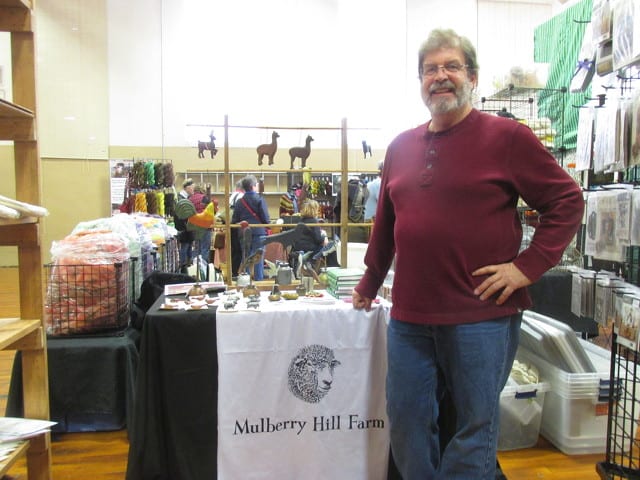SPRING MILLS — The second annual Penns Valley Fiber Festival was held on Saturday, November 2 at the Old Gregg School and Community Center in Spring Mills.
This year’s event featured 16 vendor booths, and a booth for the Pennsylvania Women’s Agriculture Network.
According to knitting and wool industries expert Clara Parkes, global wool production is dominated by Australia, New Zealand and China. America ranks third in the production of wool, producing 17 percent of the world’s wool, but production has been gradually decreasing for decades.
In recent years, however, there has been a slow-growing demand for wool yarn that’s completely produced in the United States, from sheep to skein, Parkes said.
She thinks one reason could be that consumers are turning back to wool because of the environmental risks of microplastics in garments made from synthetics. The microplastics can be released into waterways when the synthetic garments are washed.
The Penns Valley Fiber Festival showcased small domestic alpaca, goat and sheep farms, and fiber micro-mills that produce hard to find fiber and yarns of high standards and quality right here in Central Pennsylvania.
Mike Arthur, who operates Tamarack Farm near Spring Mills where they raise Icelandic, Merino, and Tunis breeds of sheep, was a vendor at the festival, and spoke regarding the value of fiber farms to the community.
“Supporting local fiber farmers is good for the local economy and environment. Buying locally keeps your money in the community and helps to create jobs. Local farmers help to preserve open space, keep taxes down, conserve fertile soil, protect water sources and sequester carbon from the atmosphere,” said Arthur.
“Fiber farm environments are a patchwork of fields, meadows, woods, ponds and buildings that provide habitat for wildlife in our communities. By supporting local fiber farmers today, you are helping to ensure that there will be farms and fiber in your community tomorrow.”
Sean Lacey, from Mulberry Hill Farm in Carlisle, was a vendor at the festival. He offered yarn from his sheep, as well as a line of small, hand-carved animals. Lacey uses basswood for his carvings because it carves easily and takes paint and other finishes well.
Greg and Gaby Weinfurter represented their company, Galiana Creations, located in Dallastown. They offered a line of hand-dyed yarns in gradient and variegated color schemes. They have been going to fiber shows within a 2.5 hour drive from their home for about seven years.
Sarah Luraschi, from Green Goat Ranch, made the trip from Middletown, N.J., to the Fiber Festival. Her ranch raises Angora goats, which produce mohair fleece. She noted that the Angora species is one of a few animals that can be shorn twice a year, making them more productive than other breeds. She attends shows in New Jersey, Maryland and Pennsylvania.



